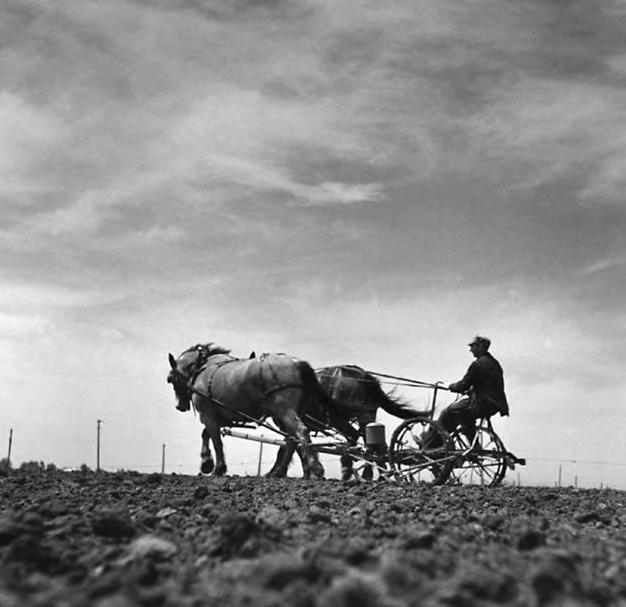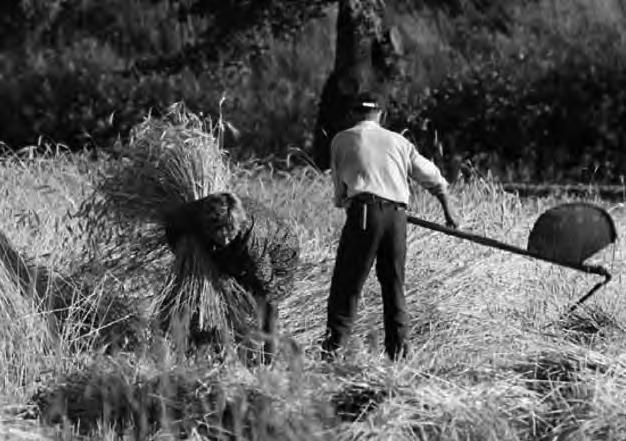
6 minute read
sowing and reaping
Once in a while, everyone entertains paradisiacal expectations in his own world of thought. A student dreams of a splendid career for himself, a sportsman of ascending the podium, and an actor of tasting the intoxication of the applause. However, reality may sometimes look quite different, including appearing as a nightmare. Sometimes there is despair, revolt, bitterness, and sometimes amazement about the unexpected end.
Popular parlance speaks of a ‘good or bad star’, under which we were born. Perhaps we should rather say: a good and bad star, although this image quite closely corresponds to reality, at least if we assume that this star is not as coincidental as it might seem to be. The traces of our comings and goings throughout our incarnations, complemented by the harvest of our current life, indeed form, as magnetic points and lines of force, an inner rmament – sometimes called the ‘auric being – in our microcosm, our small world. This rmament of every ‘inhabitant’ contains both an undesirable, and preferably an invisible dark side, as well as a luminous side, full of acquired soul quality. This constitutes a package that contains both incentives as well as constraints. Therefore, we speak of: good and bad. The charge and the quality of both elements literally form the individual destiny that – seemingly blindly – guides the personality through situations and events. This is in order, on the one hand, to use these innate gifts as a basis for development, and on the other hand, to deal with, neutralise and heal the inherited or newly acquired blemishes and injuries. There is nothing strange in this respect. This state of being works as a magnet that attracts or rejects in uences from our environment, to the extent of the longing and ambitions, with which our rmament is charged. So far, this still seems quite simple, but there is more. In general, we consider ourselves to be individuals, every person for himself, yet we are rmly linked with everything and everyone as if by invisible threads. Just as the solar system forms a separate system, which is nevertheless one with the universe, similarly every microcosm is one with the macrocosm. Every step, set by the individual, is indeed a step for humanity, either forward or backward, because there is actually only one human being, Man. And of this Man we, the personality with its physical gure, is the form of expression, just as words are the forms of expression of a language. From this link it follows that, apart from our personal input, there are also in uences of the group and even in uences of the world. In this way, we can understand how both individuals as well as population groups sometimes walk very peculiar, and even dramatic ways that cannot easily be explained by historical or current facts. Apparently, a disturbed balance must be restored, a debt repaid, a merit honoured, in whatever way, but by whom? And why by me? Which god or demon burdens me with a bond which wasn’t even signed by me? Is that this worshipped love? Is that this highly praised justice? Here we touch on the eternal question of the meaning of su ering. There is no god who keeps track of the positive and negative aspects of our comings and goings and then determines a tting punishment or remuneration. Every second, the account is settled. Actually – if we may continue this metaphor – this concerns a superhuman, lofty energy that
Advertisement
The new mode of life is not a ‘single track’, not a ‘one-way street’
keeps a sort of super-electronic or magnetic, medical record of every human being, on the basis of which the suitable therapy for healing is o ered. Are we sick, then? Yes, we might say so: too much has come between Man and human being, between language and word, between source and living phenomena. Throughout time, we have sunk ever deeper into externalities, the welter of words and matter and, therefore, we have become ever further removed from our origin, the source of life. This source is the sole equilibrium. The ow emanating from it cannot stay aloof in this increasing downward slide of human life, but we are confronted with a dilemma: the human being has a free will. Love cannot intervene, but it is able to direct and correct the ow. This is why it is sometimes said that our ‘fate’ is the best thing that could happen to us. This is a quite profound statement, but if push comes to shove, it is sometimes hard to accept. The original human being is a free being, because he is the ‘image and likeness of God’. He is absolutely free as to whether and how he will react to this o er. He may ght against it – then it becomes his fate. He may resign himself to it and make the best of it – then it is his ordinary lot. However, as a more mature soul, he can understand his course of life and accept it as a task, nding the passage to this higher spiral, the true human genesis. He can either work with his innate talents or try to bury them. By the way, this attempt to bury them only brings temporary relief; the tough nut will continue to turn up unexpectedly in one way or another until we are ready to crack it. Depending on the occasion, the ancient Greeks had a number of gods and goddesses at their disposal. The control of human fate was entrusted to Nemesis, the goddess with the blindfold and the balance; with the Romans, this was Lady Justitia. Justitia is justice; ‘Dura lex, sed lex’ (The law is hard, but it is the law!) or, to quote popular wisdom: ‘What you sow, you reap.’
In whatever way we deal with our vicissitudes, it is not a choice without consequences. It may be the beginning of a wholly new mode of life. This one will not be a ‘single track’ either, not a ‘one-way street’, because it contains both our attitude towards life as well as the attitude of life towards us; it is not a lottery. We ourselves put the rocks in our way; we ourselves dug the holes, individually as well as collectively. However hopeless it sometimes looks, we must and can clear these things our-

selves, not only for ourselves but for everyone, because in addition to reacting by revolting or patiently experiencing or by actively accepting, a fourth reaction to our fate is possible. The essence of eternity is equilibrium, harmony, justice and love. If the balance is disturbed – and it is – and justice accuses us, we may appeal to love. However, we cannot do so just like that, but only to the extent that we ourselves are love. Only through the seeing, the understanding and the compassion that opens forth in our own being, can all good and evil be dissolved. Following this helping hand may lift a human being into another reality, one in which no podium exists and that is nevertheless in nitely higher and deeper than the greatest deeds of which he would never have thought himself capable. It concerns a surprising rearrangement of his self-image and its place in the whole, independent of guilt and punishment, independent of individual achievements and successes. In this way, a new burden of guilt is avoided. Merits are no longer pursued and we become aware of the signs of both ruin as well as ascent within and around us. For every withering ower, a new bud opens – in the big world as well as in our small world – because the great, driving power of love on our long way back home means continuous renewal, until everything that was engraved throughout time will be taken up into eternity.








